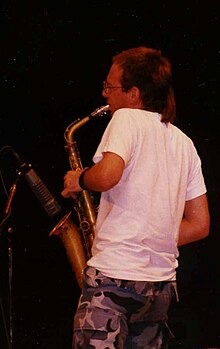Masada: Aleph
| Masada: Aleph | ||||
|---|---|---|---|---|
| Studio album by John Zorn | ||||
|
Publication |
||||
| Label (s) | DIW | |||
|
Format (s) |
CD |
|||
| occupation | ||||
|
John Zorn and Kazunori Sugiyama |
||||
|
Studio (s) |
RPM Studio, New York City |
|||
|
||||
Masada: Alef is a jazz album by John Zorn , recorded on February 20, 1994 and released on DIW Records .
The album
The album Masada: Alef was the first in a series of four albums, which - sorted according to the letters of the Hebrew alphabet - were entitled Masada: Beit , Masada: Gimel and Masada: Dalet . Essential material for all four albums was recorded on the same day. The quartet was formed in the summer of 1993 when Zorn wrote and recorded the music for the film Thieves Quartet . He was not immediately aware of the importance of this quartet for his own work.
With the Masada Quartet, Zorn proved that his contribution to jazz did not consist in adding collages to the material , but that he could also lead a classical jazz combo and play his own material with it. At the end of the 1990s the quartet was recognized as one of the most important groups in contemporary American jazz.
The album - like the whole series of works - got its inspiration for the composer Zorn from the mass suicide of the zealot defenders of the Israeli mountain fortress Masada in 73 before the conquest by the Romans (in Israel a kind of national founding myth). He dedicated it to Asher Ginzberg (1856–1927), the founder of the cultural Zionism movement . The album is - with the programmatic naming - also part of Zorn's Radical Jewish Culture project . In contrast to traditional klezmer folklore, as the title would suggest, John Zorn shows “ an overview of West Coast jazz of the 1950s ”. The line-up of Zorn (alto saxophone), trumpeter Dave Douglas , bassist Greg Cohen and drummer Joey Baron evokes memories of the most distinctive improvisation groups of those years, the piano-less Chet Baker / Gerry Mulligan Quartet and the Ornette Coleman Band around 1960. In this context, Zorn plays as a flowing legato saxophonist in the West Coast tradition and only uses his typical growls, howls, squeaks and whistles at the corner points of the title; Ornette Coleman is responsible for the asynchronous, choppy topic abbreviations. The album is reminiscent of Zorn's homages to the free jazz pioneer Coleman with the title Spy Vs Spy and the bebop pianist Sonny Clark at the end of the 1980s ( Sonny Clark Memorial Band ). The alternation of the two melody instruments in lead and accompaniment is reminiscent of Baker and Mulligan's playing. Thomas Mießgang wrote in 1995 in “Die Zeit ”: “They play the ideas unleashed back and forth, sometimes merge into jubilant ostinati , only to fall apart again and rub against each other - like Baker and Mulligan - but in a cauldron up to Boiling point heated up. "
The titles of the individual tracks on the album are reminiscent of biblical locations in Israel (such as Kanah , Janohah or Ashnah ) and important personalities of the Masada uprising (e.g. Jair ).
Rating of the album
Richard Cook and Brian Morton, who give the album the highest rating in their Penguin Guide to Jazz and find Zorn's playing on this album astonishing, criticize the repetition effect of the following albums, Beit and Gmel , reinforced by the similar cover design.
The titles
Masada: Alef - DIW Records-888
- Jair - 4:53
- Bith Aneth - 6:24
- Tzofeh - 5:13
- Ashnah - 6:20
- Tahah - 5:40
- Kanah - 7:26
- Delin - 1:54
- Janohah - 9:40
- Zebdi - 2:45
- Idalah-Abal - 6:15
- Zelah - 3:48
All compositions are by John Zorn.
literature
- Ian Carr , Digby Fairweather , Brian Priestley : Rough Guide Jazz. The ultimate guide to jazz. 1800 bands and artists from the beginning until today. 2nd, expanded and updated edition. Metzler, Stuttgart / Weimar 2004, ISBN 3-476-01892-X .
- Richard Cook , Brian Morton : The Penguin Guide to Jazz on CD . 6th edition. Penguin, London 2002, ISBN 0-14-051521-6 .
- Thomas Mießgang, record review, DIE ZEIT, February 24, 1995.
Notes and individual references
- ↑ An exception is Masada: Gimel , most of which was recorded in the summer of 1994.
- ↑ a b camo pants and Star of David: The New York avant-Star continues its long-term business Masada continued , Der Spiegel 14 May 1998
- ↑ Thomas Mießgang, DIE ZEIT .
- ↑ The fourth album in this series of works, Dalet , was a free encore for all buyers of the three other DIW albums, cf. Cook / Morton, 1599.

